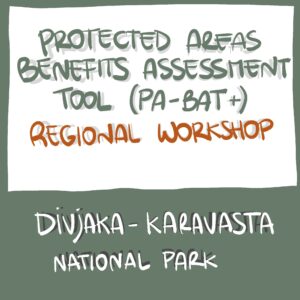On April 16, the greenery landscape of Divjakë-Karavasta National Park provided the perfect setting for a groundbreaking workshop focused on assessing ecosystem services and the flow of benefits with key local and regional stakeholders. This first-of-its-kind workshop in the area, guided by the IUCN’s Protected Area Benefits Assessment Tool (PA-BAT+), aimed to foster a shared understanding of the value of protected areas by evaluating the benefits derived from ecosystem services through the comprehensive participation of all relevant actors.
Bridging Communities and Nature: A Collective Endeavor
Participants in this dynamic event included institutions, organizations, business representatives, farmers, and local communities, all united by a common goal: to preserve and promote the natural heritage of Divjakë-Karavasta National Park. By working together to identify the most effective methods for monitoring and evaluating the benefits of these protected areas, the workshop underscored the importance of preserving vital and threatened habitats and protecting endangered species.
Key Focus Areas of the Workshop:
Shared Understanding: Establishing a standard comprehension of ecosystem values and the benefits of protected areas.
Discussion of Common Interests: Addressing issues of mutual concern among stakeholders.
Facilitation of Cooperation: Enabling collaboration among diverse parties.
Sustainable Management: Promoting sustainable management practices for protected areas.
Local Stakeholders’ Perspectives on Ecosystem Services
The workshop highlighted local stakeholders’ profound appreciation for the benefits derived from ecosystem services within protected areas. Here are some insights from various participants:
Institutions and Organizations: Recognize the critical role of ecosystem services in maintaining biodiversity and ensuring sustainable development. They view protected areas as invaluable assets for scientific research, conservation efforts, and environmental education.
Business Representatives: Understand the economic potential of eco-tourism and sustainable practices that attract visitors while preserving natural resources. They see a future where businesses can thrive harmoniously with nature, creating a balanced economy supporting livelihoods and conservation.
Farmers: Appreciate the vital ecosystem services such as soil fertility, water regulation, and pollination that directly impact their agricultural productivity. They advocate for sustainable farming practices that align with conservation goals, ensuring long-term benefits for both their livelihoods and the environment.
Local Communities: Value the cultural and recreational benefits of protected areas, recognizing them as spaces for relaxation, inspiration, and community bonding. They are committed to protecting these areas for future generations, ensuring their natural heritage remains intact and accessible.
A Step Towards Sustainable Future
This workshop marks a significant milestone in continuing to protect Albania’s protected areas, emphasizing their importance and engaging all stakeholders in sustainable management practices. Moving forward, we will continue to organize similar workshops in other national parks nationwide, building on the momentum and commitment demonstrated by all participants.
We extend our heartfelt gratitude to the Divjakë-Karavasta National Park Administration, the National Territorial Management Inspectorate (IKMT), the National Fisheries Inspectorate (IKP), the National Environment Agency (AKM), the Municipality of Divjakë, farmers, and the local community for their enthusiastic participation and high level of engagement.
Protecting National Parks Through Innovative System Use, Interpretation and Adaptation (PA-BAT+) is implemented with the support of “SMART Balkans – Civil Society for Shared Society in the Western Balkans” regional project implemented by Centar za promociju civilnog društva (CPCD), Center for Research and Policy Making (CRPM) and Institute for Democracy and Mediation (IDM) and financially supported by the Norwegian Ministry of Foreign Affairs (NMFA).

